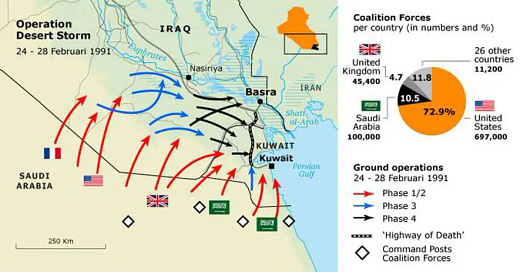“The 1899 Arbitral Award is the legal basis for our territorial integrity and sovereignty.” Guyanese Official Statements
In August 1990, the world watched in stunned disbelief as Saddam Hussein’s tanks rolled into Kuwait. Officially, it was a border dispute—a narrative cloaked in historical grievances and accusations of oil theft. But behind the facade, Iraq’s motives were unmistakably economic. Drowning in debt after an eight-year war with Iran and desperate to prop up its faltering regime, Baghdad sought salvation in Kuwait’s abundant oil reserves. The result was a resource-driven land grab that triggered one of the swiftest and most consequential international military responses since World War II.
The message from the global community was clear: in a world dependent on stable energy flows and the sanctity of sovereign borders, territorial conquest for oil would not be tolerated.
Today in the rainforests of northern South America, a new contest over hydrocarbons and sovereignty is unfolding—with eerily familiar dynamics.
Deep in the rainforests of northern South America lies Essequibo, a sparsely populated region almost twice the size of Portugal—about 159,500 square kilometers, nearly two-thirds of Guyana’s territory. This vast expanse has long been claimed by Venezuela but administered by Guyana since its independence. For decades, this dispute simmered quietly in the background of regional politics, overshadowed by other crises in the world.
That changed dramatically in 2017 when ExxonMobil announced one of the world’s largest recent offshore oil discoveries in Guyana’s Stabroek Block, revealing over 11 billion barrels of recoverable light crude. Overnight, Essequibo transformed from a forgotten colonial relic into a highly coveted prize—oil-rich and strategically vital.
This evolving conflict is about far more than territory. It pits economic desperation, energy ambitions, geopolitical rivalry, and hybrid warfare tactics against a fragile international order. The stakes include control of critical oil reserves capable of reshaping global energy markets, the sovereignty of a small but rapidly emerging energy giant, and the strategic balance in a region historically overshadowed by Cold War rivalries.
For decades, Guyana was a backwater with limited economic prospects. But ExxonMobil’s 2017 discovery of the Stabroek Block transformed its future. This block holds an estimated 11.5 billion barrels of recoverable oil—one of the largest recent finds worldwide.
Keep reading with a 7-day free trial
Subscribe to The Monetary Skeptic to keep reading this post and get 7 days of free access to the full post archives.





